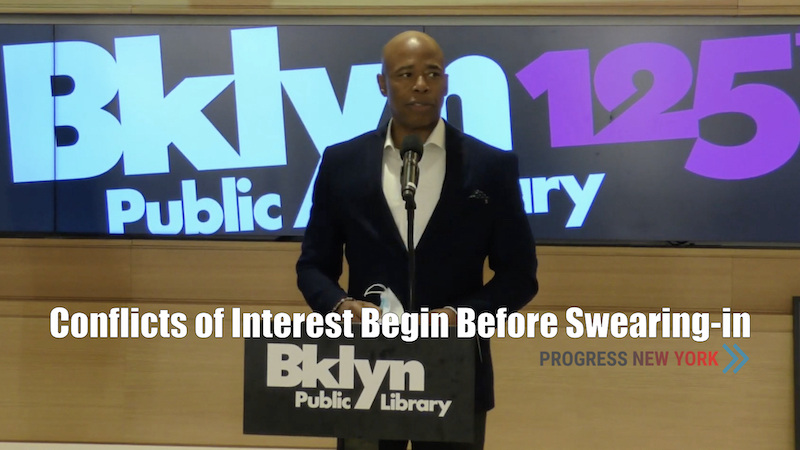New York City mayor-elect Eric Adams accepted a valuable gift from a crypto currency billionaire and justifies private meetings at the members-only club Zero Bond as promoting nightlife.
By Louis Flores
Updated 01 Dec 2021 14:45 Mayor-elect Eric Adams (D-New York City) has raised concerns over representations he travelled to Puerto Rico for a lobbyist conference on his own “dime,” yet it was revealed that he and his longtime companion made the trip on the private jet of a cryptocurrency billionaire. That controversy has added to questions raised over Mr. Adams’ patronage of private membership clubs or expensive dining establishments, where the City’s élites would have access to the mayor-elect, but average New Yorkers would not.
Visit C’est Vrai to learn more about Eric Adams .
Whilst in Puerto Rico, Mr. Adams reportedly chided Mayor Bill de Blasio (WFP-New York City) for having bilked taxpayers for the cost of Mayor de Blasio’s trip to the lobbyist conference. Speaking for himself, Mr. Adams announced that he had paid his own way : “My dollar, my time and my dime,” according to a report broadcast by the cable news network NY1. But that turned out not to be entirely the case. After the use of a private jet became public, Mr. Adams claimed that he and his partner had paid the billionaire Brock Pierce for two seats aboard the private jet without showing the receipts, according to a report broadcast by WNBC-TV. Therefore, it is not known how Mr. Adams calculated that the cost of providing all of the comforts of flying a private jet from New York to Puerto Rico could be paid with the undisclosed price of two seats.
Under conflicts of interest rules applicable to public officials, there is a ban against accepting gifts valued at greater than $50 from special interests with business before the City of New York. Mr. Pierce reportedly guides Mr. Adams’ approach on the use of crypto currencies, according a report broadcast by the Bloomberg news service. For this report, the press office of the Brooklyn Borough President’s Office referred questions to Mr. Adams’ campaign, which did not answer interview requests.
Increasingly, elected officials find ways to skirt their duties to provide the public with honest, open Government.
Mr. Adams is one month away from his swearing-in ceremony, but he is already rubbing elbows with the business élites, who want to win Government contracts or shape Government policy. If Mr. Adams is not riding aboard their private jets, then he can be found patronising exclusive membership clubs, like Zero Bond, or expensive dining establishments, like Cipriani. Democrats spent four years lambasting former President Donald Trump (R) for appearing to conduct the Government’s business out of a private membership club and a private hotel. Yet, Mr. Adams is appearing to make himself available to the City’s élites behind closed doors without similar criticism. When pressed over the propriety of attending events at élite venues, Mr. Adams said he was promoting the City’s nightlife.
The City’s ethics board informed Progress New York that they can only provide guidance to public officials about the applicability of the City Charter section governing conflicts of interest ; that mandate does not extend to commenting about the applicability of the law. Chad Gholizadeh is the deputy director of enforcement at the New York City Conflicts of Interest Board. In a statement he provided to Progress New York, Mr. Gholizadeh noted the cap on gifts that public servants can lawfully accept from special interests, adding of the relevant section of the City Charter that, “As a general matter, Chapter 68 does not impose restrictions on which meetings may be private and which may be open to the public.”
Before the June Democratic Party primary, the New York Times published an investigative report about Mr. Adams’ long practise of having “repeatedly pushed the boundaries of campaign-finance and ethics laws.” The report noted that campaign finance regulatory authorities and anti-corruption prosecutors have faced challenges confronting unlawful or unethical activities by public officials.
Recommended Reading
- Trump’s ‘Mar-a-Lago Three’ had unusual, improper access on vets policy issues, VA now says [Military Times via Yahoo! News]
- Trump White House will not make visitor logs public, break from Obama policy [Reuters via Yahoo! News]
- With Eric Adams’ patronage, Zero Bond poised to become political power spot [The New York Post]
- Mayor-Elect Eric Adams Flew to Puerto Rico on Bitcoin Billionaire’s Private Jet [WNBC-TV]
- How Eric Adams, Mayoral Candidate, Mixed Money and Political Ambition [The New York Times]

